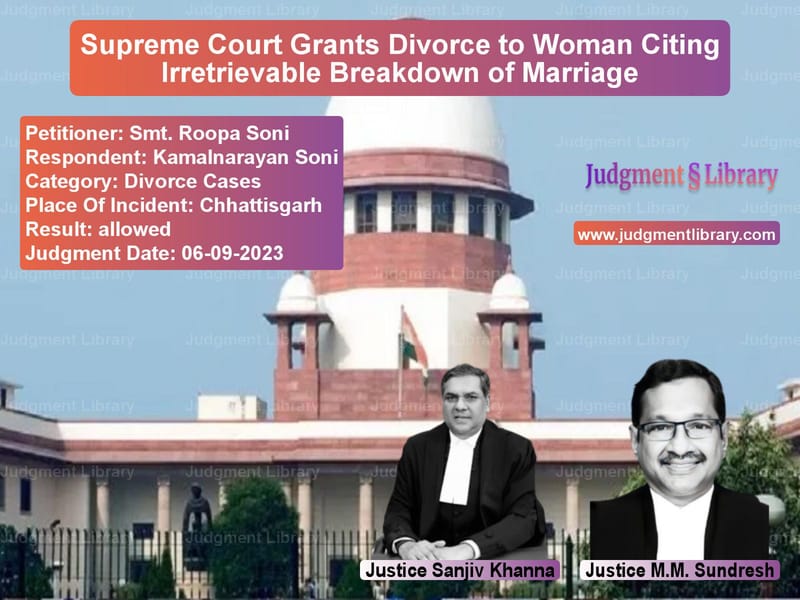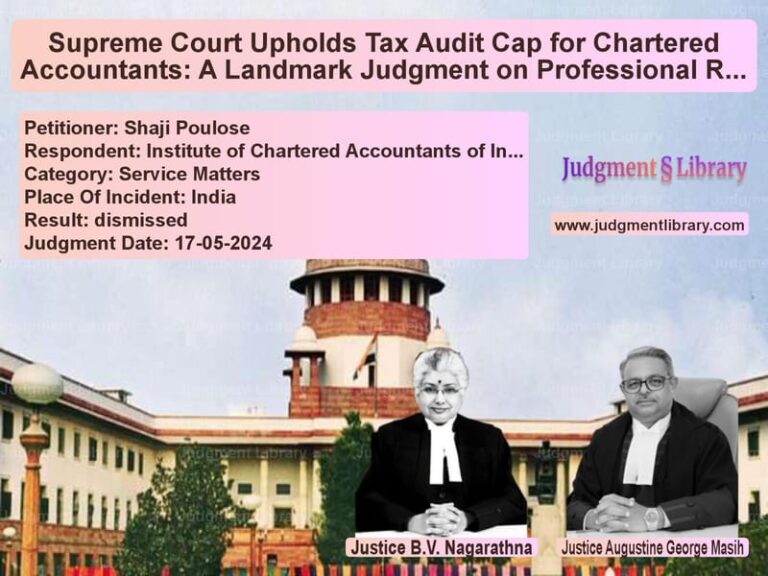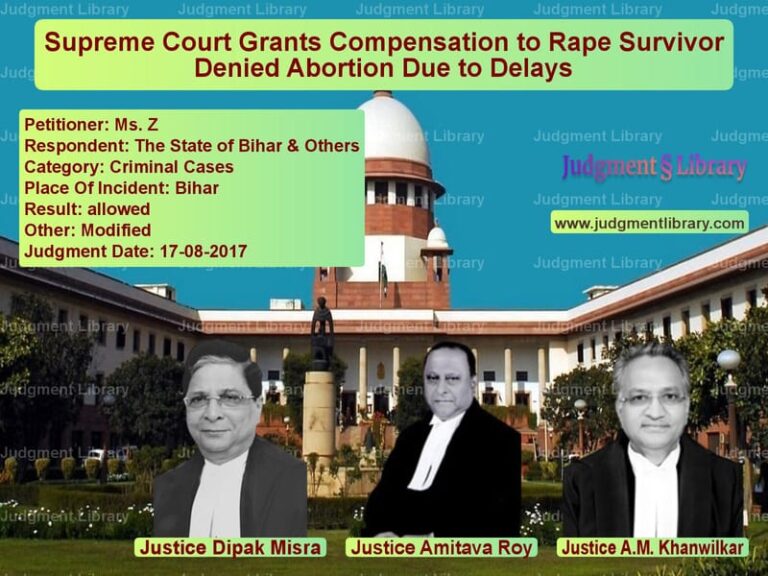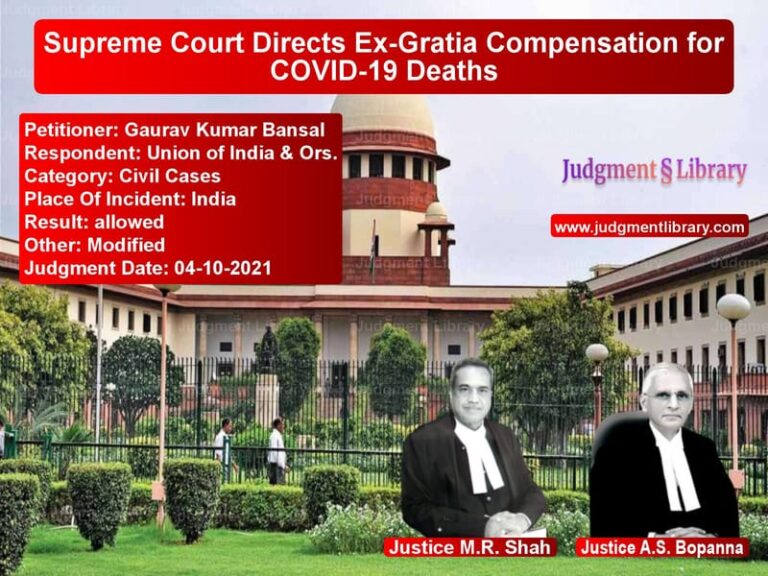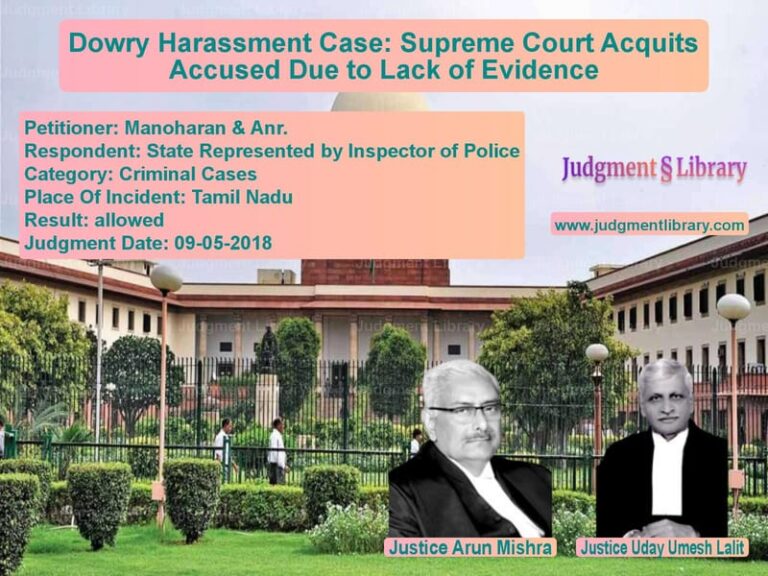Supreme Court Grants Divorce to Woman Citing Irretrievable Breakdown of Marriage
The Supreme Court of India recently granted a decree of divorce in the case of Smt. Roopa Soni v. Kamalnarayan Soni, emphasizing the concept of irretrievable breakdown of marriage. The case involved allegations of cruelty, desertion, and accusations of adultery between the spouses. The Court, while setting aside the decisions of the Trial Court and the High Court, granted the divorce and highlighted the need for a pragmatic and empathetic approach in matrimonial disputes.
Background of the Case
The marriage between the appellant (wife) and the respondent (husband) was solemnized in 2002. However, disputes arose soon after, particularly after the birth of their child. The appellant alleged cruelty by the respondent, leading her to file a complaint under Section 498A of the Indian Penal Code (IPC) and the Dowry Prohibition Act, 1961.
In response, the respondent accused the appellant of adultery and sought a medical examination to prove his claim. This request was rejected by the High Court. The parties had been living separately for over a decade and had engaged in prolonged litigation regarding divorce.
Chronology of Legal Proceedings
- The appellant filed for divorce citing cruelty and desertion.
- The Trial Court rejected the divorce petition, stating insufficient proof of cruelty.
- The High Court upheld the Trial Court’s decision, maintaining that the marriage had not reached an irretrievable stage.
- The appellant approached the Supreme Court, arguing that the marriage was beyond repair.
Legal Issues Before the Supreme Court
The Supreme Court had to determine:
- Whether the allegations of cruelty and desertion were substantiated.
- Whether irretrievable breakdown of marriage is a valid ground for divorce under the Hindu Marriage Act, 1955.
- Whether the lower courts erred in dismissing the divorce petition.
Arguments by the Petitioner (Appellant)
The appellant, represented by her counsel, contended:
- The marriage was irreparably damaged, with both parties making serious allegations against each other.
- The respondent had publicly humiliated her by questioning her character.
- Despite multiple attempts at reconciliation, the parties had been living separately for over 15 years, proving that the marriage was beyond repair.
- Forcing them to remain legally married would serve no purpose and would only cause further agony.
Arguments by the Respondent
The respondent countered:
- The appellant’s allegations of cruelty were exaggerated and unproven.
- The absence of cohabitation did not automatically lead to divorce under the Hindu Marriage Act.
- The lower courts were correct in their findings and the Supreme Court should not intervene.
Supreme Court’s Analysis
The Court analyzed the case within the framework of the Hindu Marriage Act, 1955, and relevant precedents.
1. The Concept of Cruelty in Matrimonial Disputes
The Court reiterated that cruelty is a subjective concept and varies with circumstances. It observed:
“The word ‘cruelty’ under Section 13(1)(ia) of the Act of 1955 has no fixed meaning and must be interpreted contextually.”
The Court cited Vishwanath Agrawal v. Sarla Vishwanath Agrawal and Shobha Rani v. Madhukar Reddi, emphasizing that cruelty includes mental and emotional suffering.
2. Irretrievable Breakdown of Marriage as a Ground for Divorce
The Court acknowledged the growing acceptance of irretrievable breakdown as a basis for divorce. It referenced the Law Commission’s recommendations and past judgments, including Shilpa Sailesh v. Varun Sreenivasan, stating:
“The situation must be such that the wronged party cannot reasonably be expected to live with the other.”
The Court found that the prolonged separation and mutual animosity demonstrated that the marriage had collapsed.
3. The Need for a Liberal Approach
The Court emphasized the need for a pragmatic approach in matrimonial disputes:
“A home that is meant to be a place of love and companionship should not turn into a source of constant agony and suffering.”
It also highlighted the impact of marital discord on children, citing Thrity Hoshie Dolikuka v. Hoshiam Shavaksha Dolikuka, where it was observed that children suffer immensely when their parents engage in prolonged legal battles.
Supreme Court’s Judgment
The Supreme Court set aside the judgments of the Trial Court and the High Court, granting the decree of divorce. It observed:
“The parties have moved on with their lives separately. There is no need to continue the agony of a mere legal status without them living together.”
Recognizing the woman’s right to dignity, the Court directed that any pending financial and custodial disputes be settled as per law.
Implications of the Judgment
This ruling has significant implications:
- Recognition of Irretrievable Breakdown: The Court reinforced that prolonged separation and irreconcilable differences warrant a divorce decree.
- Protection of Women’s Rights: The Court emphasized that accusations of adultery must not be used to harass or defame women.
- Impact on Future Divorce Cases: The judgment sets a precedent for handling cases where spouses have lived apart for extended periods.
Conclusion
The Supreme Court’s ruling in Roopa Soni v. Kamalnarayan Soni is a landmark judgment that balances legal principles with social realities. By recognizing the futility of forcing a legally dead marriage to continue, the Court has taken a progressive step in Indian matrimonial law.
Petitioner Name: Smt. Roopa Soni.Respondent Name: Kamalnarayan Soni.Judgment By: Justice Sanjiv Khanna, Justice M.M. Sundresh.Place Of Incident: Chhattisgarh.Judgment Date: 06-09-2023.
Don’t miss out on the full details! Download the complete judgment in PDF format below and gain valuable insights instantly!
Download Judgment: smt.-roopa-soni-vs-kamalnarayan-soni-supreme-court-of-india-judgment-dated-06-09-2023.pdf
Directly Download Judgment: Directly download this Judgment
See all petitions in Mutual Consent Divorce
See all petitions in Alimony and Maintenance
See all petitions in Property Division in Divorce Cases
See all petitions in Judgment by Sanjiv Khanna
See all petitions in Judgment by M.M. Sundresh
See all petitions in allowed
See all petitions in supreme court of India judgments September 2023
See all petitions in 2023 judgments
See all posts in Divorce Cases Category
See all allowed petitions in Divorce Cases Category
See all Dismissed petitions in Divorce Cases Category
See all partially allowed petitions in Divorce Cases Category

